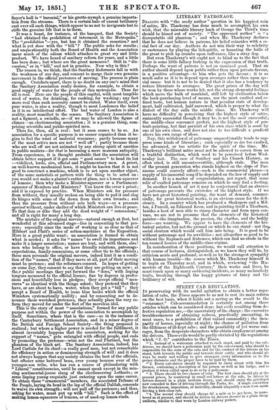LITERARY PATRONAGE.
DEALING with " the seedy author" question in his happiest vein of satire, Mr. Thackeray has done much to accomplish his own wish, that the miserable literary hack of George the Third's time should be hissed out of society. " The oppressed author" is " a disreputable old phantom " ; and when Mr. Thackeray declares that he does not believe in patrons, his belief coincides with a so- cial fact of our day. Authors do not win their way to celebrity or sustenance by playing the lickspittle, or haunting the halls of the great to pick up crumbs upon sufferance, like a stray dog.
But even Thackeray's wit ought not to blind us to the fact that there is some little fallacy lurking in the expression of that truth. Perhaps the want of patrons is not an unmixed good. That an author should depend upon public rather than upon private favour, is a positive advantage—to him who gets the favour ; it is as much safer as it is to depend upon averages rather than upon spe- cial cases: but it is not to be denied that it also has a tendency to reduce literature to averages. The great prizes of the day will be won by those whose works hit, not the strong elemental feelings which move the bulk of mankind, still left by civilization below the book-purchasing level of means, nor the most exalted and re- fined taste, but human nature in that peculiar state of develop- ment, half cultivated, half narrowed, which is proper to what the dialect of the day calls the middle class. Mr. Thackeray will have no difficulty in perceiving that the highest style of satire, eminently successful though it may be, is not the most successful; the middle-class consumer prefers, not the highest style of por- trait-painting, but that portrait of his own class which is made by one of his own class, and does not rise to too difficult a gradient above his own range of ideas.
Nay, this withdrawal of patronage unquestionably tends to sup- press some kinds of literature ; such especially as are too exalted, too advanced, or too artistic for the spirit of the time. Mr. Thaekeray's brilliant satire must not be allowed to screen from us a truthful distinction, which used to be perceived before Wed- nesday last. The case of Southey and his Church Histdry, so often cited, is still uncontrovertible, although stale. The man of the present generation who stands highest on the slope of Par- nassus could scarcely afford—such is the commercial phrase—a supply of his immortal song if he depended on the law of supply and demand. It is a matter of congratulation, not regret, that some relic of exalted patronage remains on which he may find a footing.
In another branch of art it may be conjectured that an absence of patronage prevents the existence of the highest style. If we have not great historical painting, the want of demand, commer- cially, for great historical works, is an obvious cause for the defi- ciency. In a country which has produced a Shakspere and a Mil- ton, a Purcell, an Edmund Kean, and in painting itself a Thorburn, besides a host of men able to stamp character and form upon can- vass, we are not to presume that the elements of the historical painter—the imagination, the passion, the rhythm, and the bodily force—are wanting. We appear to have the elements of the his- torical painter, but not the ground on which he can stand—not th social stratum which would call him into being. It is good to b4 without patronage and its servilities ; not altogether so good to be without the Raphaels and Rubenses, which can find no abode in the ten-roomed houses of the middle-class regime. In corroboration of these positions, we would call attention to that course of lectures, distinguished, as we know they will be, by criticism acute and profound, as well as by the strongest sympathy with human trouble—the course which Mr. Thackeray himself is to begin on Thursday next, and in which, reviewing "the Hu- morists of the Eighteenth Century," their works and lives, he must touch upon so many saddening incidents, so many melancholy traits, breaking -through the happy pictures of fancy and the brilliancy of wit.


























 Previous page
Previous page